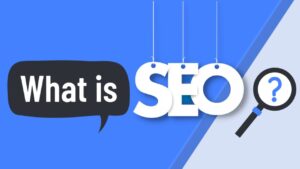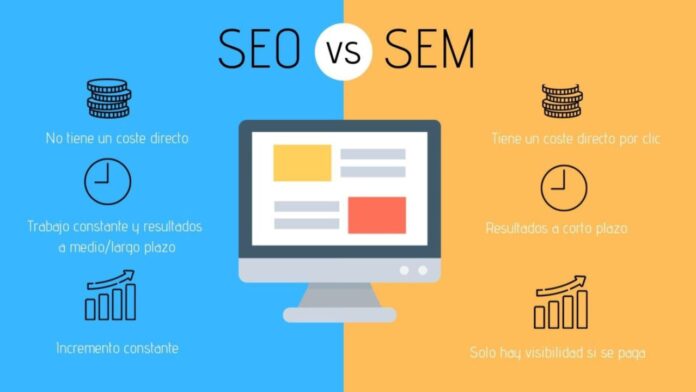In the ever-evolving digital marketing landscape, two acronyms often buzz around like busy bees SEO vs SEM. These two marketing tactics, SEO and SEM, may appear like alphabet soup to some people, yet they are the keys to your company’s online success.
Today, using plain English free of technical jargon, we’ll delve deeply into the worlds of Search engine marketing (SEM) and SEO are two related terms.
When this article is finished, you’ll know which approach is best for your company. So, let’s get going!
What is SEO?

SEO, or Search Engine Optimization, is like tending to a beautiful garden. It’s all about making your website bloom naturally in search engine results, while SEM, on the other hand, focuses on achieving quicker results through paid advertising.
When someone enters a search term into Bing, SEO ensures that your website’s pages appear at the top organically. No paid ads are involved here. SEO is your green thumb in the digital world.
Key Characteristics of SEO:
- Organic Traffic: SEO primarily relies on natural, unpaid search results.
- Long-Term Strategy: It takes time to see significant results, but the benefits are long-lasting.
- Cost-Effective: SEO can be more budget-friendly in the long run than SEM.
What is SEM?
Conversely, SEM, or Search Engine Marketing, is like planting a tree that bears fruit quickly. It involves paid advertising to appear at the top of search results.
You bid on specific keywords, and when someone searches for those keywords, your ad pops up. SEM is the fast track to getting noticed online.
Key Characteristics of SEM:
- Paid Advertising: SEM involves paying for ads to appear in search results.
- Immediate Results: You can see results when your ad campaign is active.
- Budget-Dependent: SEM can be costly and requires ongoing spending to sustain results.
SEO vs SEM: What’s the Difference?
SEO and SEM (search engine marketing) are related terms, but they are separate digital marketing techniques. SEO is a natural, long-term strategy to increase a website’s exposure in search engine results.
Ranking higher organically entails optimizing content, user experience, and site structure. Additionally, SEM, or Search Engine Marketing, involves paid advertising to achieve immediate visibility in search results.
On the other hand, SEM includes compensated tactics like Google Ads, in which marketers place bids on certain keywords to have their ads appear in search results. SEM comes at a price but provides more rapid results and accurate targeting.
In conclusion, SEO takes time and patience to optimize for better ranks, whereas SEM depends on paid advertising for rapid visibility. Your goals, money, and timing will determine your best option.
When to Use SEO?
Consider using SEO when:
- You’re in it for the long haul.
- Building organic traffic and trust with your audience is your priority.
- You have the patience to wait for results to accumulate.
- You’re on a tight budget and need a cost-efficient plan.
When to Use SEM?
Opt for SEM when:
- You need quick results.
- Your budget allows for paid advertising.
- You want to target specific keywords.
- Testing different marketing strategies is on your agenda.
The Cost Factor
The price is one key distinction between SEO and SEM, also known as SEO vs SEM. SEO is like tending to a garden; it requires ongoing care and nurturing, but the expenses are relatively low compared to SEM.
SEM is more like running a sprint; it can get costly, and the spending continues if you want to maintain your online presence
Long-Term vs Short-Term Results
SEO is the marathon runner of the digital marketing world. Significant effects take time to appear, but you reap long-lasting rewards once you cross the finish line. SEM is the sprinter, offering immediate rewards, but you’ll need to keep running to maintain those results.
Measuring Success: SEO vs SEM
SEO success is measured by tracking organic traffic growth, keyword rankings, and user engagement.
SEM success is more straightforward to measure because you can see immediate results in ad clicks, conversions, and ROI. Both have their metrics; it’s just a matter of what suits your goals.
The Role of Keywords
Keywords are the compass for both SEO and SEM. In SEO, you enhance the content of your website with pertinent keywords to draw in organic visitors.
In SEM, you bid on keywords, such as ‘SEO vs SEM,’ to display your ads to a targeted audience. Whether nurturing your garden or running a race, keywords are your guiding stars.
The Synergy of SEO and SEM
Here’s a secret: SEO and SEM, often pitted against each other, can actually work together like peanut butter and jelly. By combining both strategies, you can cover all bases.
Use SEM for immediate visibility while your SEO efforts take root. Over time, you can reduce your SEM spending as your SEO rankings climb. It’s a winning combination.
Conclusion
There must be a clear winner in the epic battle of SEO vs. SEM. The right strategy for your business depends on your goals, budget, and timeline. SEO is your loyal companion if you’re looking for sustainable, long-term growth.
If you need quick wins and have the budget to spare, SEM can catapult you to the top. In many cases, the smartest move is to embrace both strategies and let them complement each other.
FAQs
Can I use SEO and SEM together?
Absolutely! SEO and SEM can work hand in hand to give your business the best of both worlds. Start with SEM for immediate results and gradually reduce your spending as your SEO efforts kick in.
Is SEO or SEM better for small businesses?
It depends on your goals and budget. Small businesses with limited budgets might find SEM more accessible for quick visibility. However, long-term, sustainable growth often comes from SEO.
How long does it take to see results with SEO?
SEO is a marathon, not a sprint. It can take several months to see significant results. Patience is key in the world of SEO.
Can I do SEO, or need to hire a professional?
You can certainly DIY SEO, but it can be complex and time-consuming. Many businesses hire professionals specializing in SEO to get the best results.
What’s the biggest mistake businesses make with SEM?
One common mistake is to optimize ad campaigns properly. To make the most of SEM, conducting keyword research, creating compelling ad copy, and monitoring and adjusting campaigns regularly is essential.



